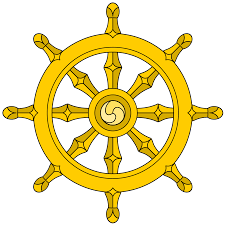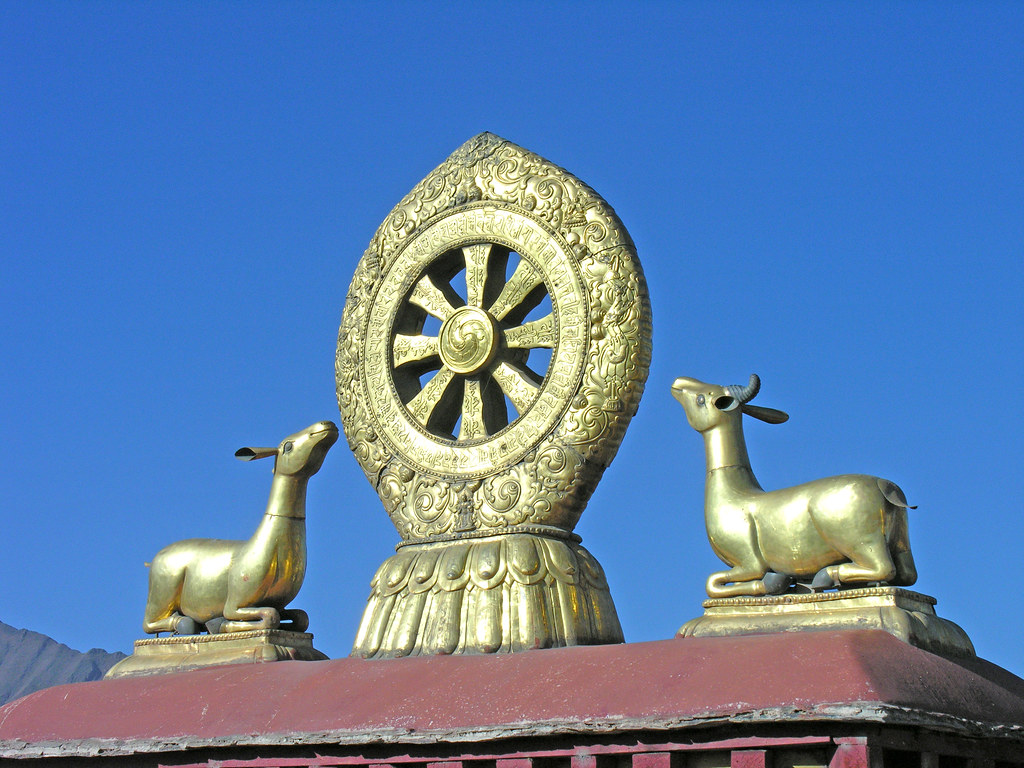There is causality in evolution, that causality is recognized in Buddhism. The evolution itself cannot become a theory, as it is not of a law in and of itself, the only law is of casual dependence, only the law itself can be the theory. Whatever theory one ascribed to evolution will always be limited by circumstances and availability of scientific means of observation. This is where Buddhism recognized evolution and yet is not limited to the theory of evolution. The theory of evolution does not base on any law except from what is observed, and this poses a problem with the unobservable, that is, the expected yet unforeseen future evolution of the species, though by recognizing the importance of causality, future prediction can be pretty accurate.
What does evolution have to do with Buddhism?
The question “What does evolution have to do with Buddhism?”, it does by the fact that evolution occurred on the basis of causality which is recognized by Buddhism, and it does by the fact that evolution recognized the basis of causality from which to based the observation. Thus both the theory of evolution and Buddhism recognized causality. By this both have to do with each other by this recognition, not before.
As for the doctrine of suffering, it can make itself proven scientifically by the fact of evolution, that all species will finally reached extinction due to various changes, which is the basis of impermanent, which is the root of suffering, where the emotion of hopelessness and despair are the common constitute.
As for enlightenment, the enlightenment as a solution to suffering, has to do with evolution by the fact of the suffering it helped proven scientifically, a fact which is needed to recognize the urgency for such a solution.
As for desire/craving, it has to do with evolution by the fact that evolution proved desire to do motivation factor of the success of the species, a success which can ultimately lead to self-destruction of the species, that is, if evolution theorists care enough to focus on the evolution of warfare to predict the inevitable, if human *civilization* is to apply the primitive principal of survival unto themselves, instead of them evolved beyond the physical craving, to embank on a path of spiritual evolution, as envisioned and taught by the Buddha.
Physical Evolution to Spiritual Evolution

From physical evolution to spiritual evolution is the path of Dharma, thus *evolution* has much to do with Buddhism, and all the other factors, as suffering, desire, and so on are related to the path. It is common for evolution theorists or believers to assume evolution occurs from physical to spiritual, that is, if there is a spiritual end. In that concept, evolution is the mean of traversing the path. However, if one speaking in term of evolution based on craving, anger, and delusion, the factors which make a species move on top of the food chain, it will never cross the barrier that lead to the other shore of spiritual evolution, instead these three negative emotions will lead them to endless suffering and self-destruction.
Rather, it is the evolution of the human mind, from lower to higher intellectual capacity that enable one of them to finally perceived the knowledge of liberation from the suffering they were previously unable to escape. The Buddha is born as a highly evolved human of high intellectual capacity, this enable him to perceive the true suffering which is impermanence, to crave for the liberation of it, to seek the path that lead to it, to discover the true path, and to demonstrate to others the path of liberation.
Suffering lead to desire to be free from the suffering, if one is suffering from hunger, one will desire food, and may kill for it, to kill he must perfect his killing technique, the last required intellect, the higher the intellect, the higher he chance to achieve dominance on the food chain. However, by mean of higher intellect, there is a chance that he also sees the true suffering which cannot be eliminated by mere supply of food, he realizes disease, old age and decay are the appearance of suffering which is rooted in impermanence, and he realizes impermanence is ill, and so there is a need to attain freedom from ill. If the path required that ordinary desire for food be suppressed, replaced instead with the desire for freedom, that he will accomplished by mean of resolve and discipline. It is hard for those with low intellect to do any of these, so the difference between low and high intellect has to do with evolution of the human mind, evolution is clearly the aid, not the enemy of Buddhism. It is correct to say, Buddhism is impossible to be learn by mentally un-evolved species.
Physical desire is really the basic instinct in all species that can move and feel. It is so common an ability that there is no need to be learn, but Buddhism is a learnt knowledge, or a knowledge that is realized by a highly evolved mind, by that knowledge and capability to master it, that little desire is really not hard to be put under restrain, it may be difficult for those less intellectually gifted and impossible with other species.
Enlightenment is the stage of the end of evolution of all the species, but before the species can evolve to this stage, there is a need for the species to propagate in order to evolve an intellectual mind. What the species need is the end stage of evolution – enlightenment. Enlightenment is the end-goal of all species, a goal cannot be had until it is reached, enlightenment therefore cannot be present to support a species’ misery – their state of suffering, including all those factors that facilitate their propagation. For everything else is ill, enlightenment is not of the ill, it cannot be there to support the ill. A person can be enlightened and yet be involved in normal activities of propagation, but that enlightenment does not help in this aspect of existence.
Buddhism recognized causalities as factors that facilitate enlightenment, thus it does focuses on causalities factors as an aid to enlightenment. It accomplished it by mean of introducing virtuous conducts which essentially mean refraining from committing un-virtuous conducts. These virtuous conducts will in a way much more conducive to the survival and propagation of the species as compared to pure primitive instincts of craving, anger and delusion. Thus, before the glimpse of enlightenment, Buddhism introducing enlightened intentionalities for beings still overcomes by primitive instincts. So that their conducts be in accord to evolved civilization as opposed to being uncivilized salvagers on top of the food chain.
Other religions are also product of evolved civilization
Though the principal behind the teachings may be different, they all shared a common goal – the cessation of suffering. Whether enlightenment is solely inherent genetic qualities, this should not be a concerned as anything genetic is shared on a common ancestor which we all have but one. Technically, enlightenment is not a quality, but a state of the mind, if it is a quality, then it is no necessity to seek since it is already present, but as it is a state, until we are at it, we do not see it. As we do not see it, expecting a reason to believe it is in vain, as only seeing will believe. Though a mind of higher intellect will figure it out by having exhausted all intellectual analysis, but until then anything less will not be sufficient.





